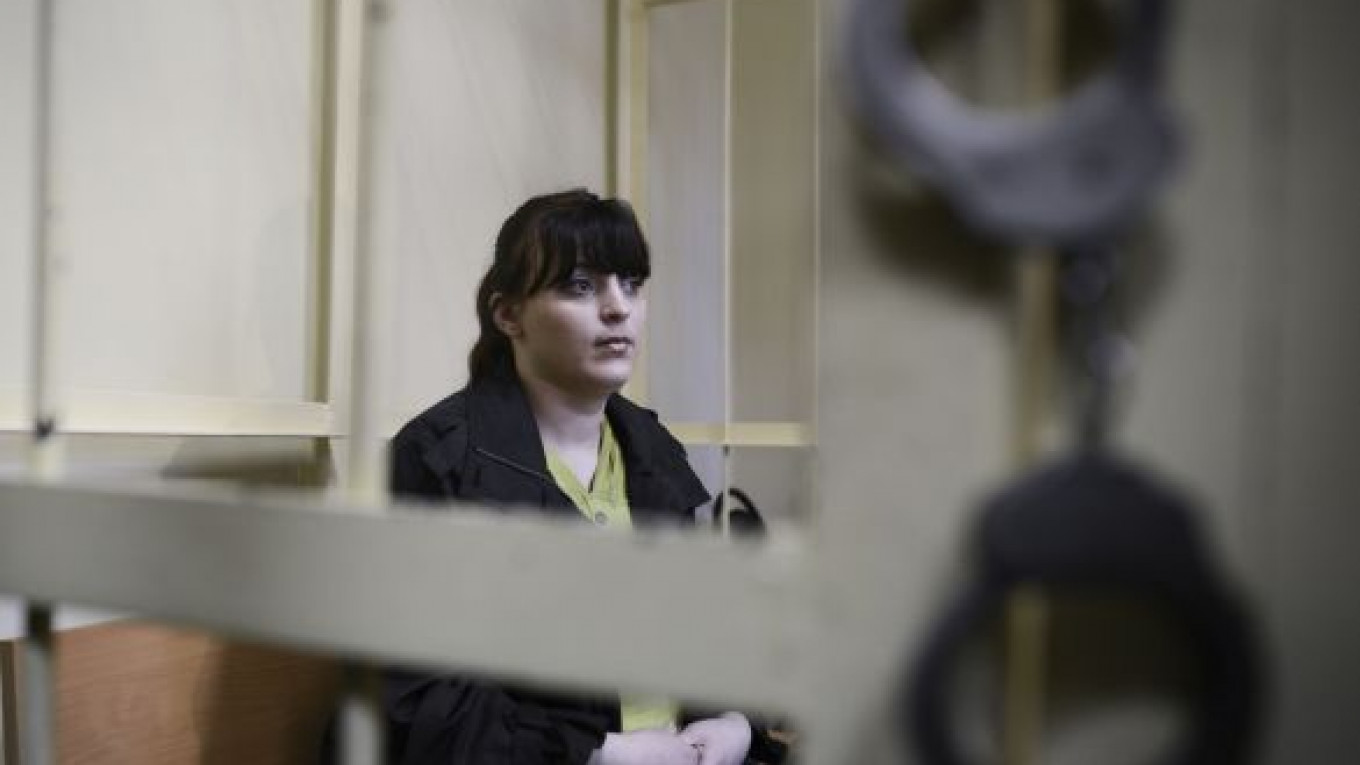A court in Smolensk has sentenced the wife of an opposition political activist to eight years in prison on drug-related charges, even though the prosecution had asked the court to give her half that amount of jail time.
Smolensk's Zadneprovsky District Court on Tuesday sentenced Taisia Osipova, who has a 5-year-old-daughter and has been diagnosed with diabetes, to eight years in prison on charges of selling drugs.
Political pundits drew parallels between Osipova's case and the recent ruling in the case against members of punk group Pussy Riot, saying the verdicts indicate that after an easing in the state's treatment of the opposition under former President Dmitry Medvedev, hardliners in Vladimir Putin's Kremlin are tightening the screws.
Osipova, 28, denied the charges against her, saying the drugs were planted on her by police to pressure her husband, a political activist with the Other Russia movement.
Other Russia is an unregistered opposition party with nationalist and communist political views.
The verdict in the Osipova case also deals another blow to the reputation of Medvedev, now prime minister, who in March told Moscow State University journalism students that he would ask prosecutors to review the case.
In December 2010, Osipova was sentenced to ten years in prison by the same Zadneprovsky court on the same charges. After Medvedev asked for the case to be reviewed, the ruling was overturned by a higher court and sent back to the Smolensk court.
Pavel Chikov, head of human rights group Agora, which also provides legal assistance to civil activists, said the court verdict in Osipova's case and the ruling in the Pussy Riot trial were part of a general crackdown on the opposition by Putin's Kremlin.
"Both these verdicts demonstrate that politics in the country has changed and after a thaw, new authorities are ready to suppress opposition activity," Chikov said.
Three female members of Pussy Riot were each sentenced to two years in prison for participating in a performance deriding Putin in Christ the Savior Cathedral in February.
Tuesday's ruling also provoked outrage from anti-Kremlin groups. Opposition leader Sergei Udaltsov, writing on Twitter, called for a protest against the verdict at the Investigative Committee building on Thursday.
Osipova's lawyer Svetlana Sidorkina said she would appeal the court decision, which some human rights groups see as harsh punishment for a mother diagnosed with diabetes.
Osipova, the wife of Other Russia activist Sergei Fomchenkov, was arrested in November 2010 on suspicion of trying to sell drugs to a police agent. Police said they later found four grams of heroin during a search of her apartment.
The charges against her were based on the testimony of a secret witness, a person Osipova identified during the court hearings as a female acquaintance of hers.
Osipova's defense said the case was politically motivated, pointing to the fact that narcotics police had conducted their operation against her alongside anti-extremism officers. The police justified the presence of the anti-extremism forces by saying Osipova had once been involved in radical political activity.
The testimony of police officers was challenged by her friend Anton Mandrik, who was at her home during the search. He later passed a polygraph test in which he repeated his statements questioning the police's version of events.
Pavel Salin, an analyst with the Center for Current Politics think tank, noted that it was unusual for a Russian court to give twice as much jail time as prosecutors requested, suggesting it reflected a conflict within the legal system.
Political analyst and former Kremlin insider Gleb Pavlovsky said that while Medvedev's early position regarding the Osipova case was vital in initiating a retrial, the new verdict demonstrated that "leverage has started to work in the opposite way."
"This verdict is a demonstration that Medvedev's political statements do not have any power and that there is a trend toward showing cruelty" to opposition activists accused of crimes, Pavlovsky said by telephone.
Medvedev's spokeswomen Natalya Timakova said the prime minister's position regarding Osipova had remained the same and noted that he could not interfere in court decisions.
"He still thinks that the ruling should fit the crime," Timakova said, Interfax reported Tuesday.
The verdict was supported by senior members of the ruling United Russia party, headed by Medvedev.
"Attempts to justify selling drugs by citing political motives appear mad," State Duma security committee head Irina Yarovaya of United Russia said Tuesday in comments carried by the party's official website.
According to Salin, of the Center for Current Politics, the ruling in Osipova's case shows that supporters of a hard-line approach to the opposition "are not going to surrender."
Related articles:
A Message from The Moscow Times:
Dear readers,
We are facing unprecedented challenges. Russia's Prosecutor General's Office has designated The Moscow Times as an "undesirable" organization, criminalizing our work and putting our staff at risk of prosecution. This follows our earlier unjust labeling as a "foreign agent."
These actions are direct attempts to silence independent journalism in Russia. The authorities claim our work "discredits the decisions of the Russian leadership." We see things differently: we strive to provide accurate, unbiased reporting on Russia.
We, the journalists of The Moscow Times, refuse to be silenced. But to continue our work, we need your help.
Your support, no matter how small, makes a world of difference. If you can, please support us monthly starting from just $2. It's quick to set up, and every contribution makes a significant impact.
By supporting The Moscow Times, you're defending open, independent journalism in the face of repression. Thank you for standing with us.
Remind me later.






